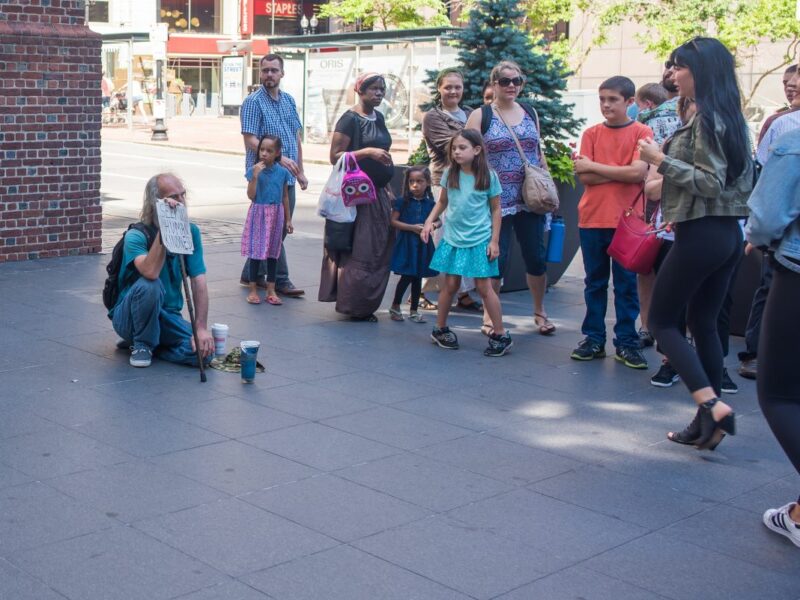I was driving through the heart of downtown Los Angeles when I found myself going through a homeless encampment under a freeway overpass. Tents, cardboard boxes, plywood, bicycles, and blue tarps were lined up against a chain-link fence for an entire block.
As I looked closer, I saw a girl in her twenties in tight jeans standing by the side of the road showing her friend a pair of strappy, black heels she was wearing. Hand on hip, she swayed her foot back and forth like a windshield wiper. Her friend smiled and nodded enthusiastically.
This simple interaction of two friends admiring a pair of shoes touched me. I couldn’t help but wonder how they had ended up living on the streets.
In June 2020, the Los Angeles Homeless Services Authority (LAHSA) issued a report revealing a 12.7% increase in homelessness in L.A. County in the past 12 months, resulting in over 60,000 unhoused people. That same report noted that the cause of homelessness could vary from domestic violence, family issues, and substance abuse to mental illness and lack of affordable housing. LAHSA also reported that 60% of the homeless population has cycled through the criminal justice system.
In the mid 90’s I spent a year incarcerated in the Los Angeles County jail.
I lost everything due to my long and hard battle with drug addiction. I had separated from my husband, my eldest son was in juvenile hall, and I didn’t have a place for my ten-year-old son and me to live.
Although I had a sincere desire to turn my life around, the county jail hadn’t provided any reentry program with referrals or contacts for when I got out. As a result, I was totally unprepared.
The uncertainty, fear, and self-loathing that came from being a mother who couldn’t provide the basic necessities for her child shamed me to my core. However, I was fortunate enough to have a kind woman who refused to look the other way and helped my son and me get a room in a women’s and children’s transitional living center.
I was grateful to have a place to sleep, but I soon discovered that having shelter was only the first step in stabilizing my chaotic, newly-sober life. Lacking any marketable skills, I didn’t know how to find a job, how I’d get food, transportation, or any of the simple things that most people take for granted.
I was fortunate to land in a program that gave me access to an expansive array of resources. I met other mothers in similar situations who offered their knowledge and support. As a community developed around me, I quickly learned where the local food pantry was, how to apply for bus tokens and who could help me with a resume.
But a lot has changed since then.
We have more people sleeping in public places today. Despite skyrocketing rents, the coronavirus pandemic caused people to lose their jobs. Too many people’s lives began to unravel while we collectively looked the other way. Too many people dismiss unhoused people as having made bad choices, and there’s nothing to be done about it.
Every night more people are sleeping on the streets of Los Angeles. Fathers, mothers, daughters, and sons from all walks of life.
Shelter is only the first step in combating the issue and obtaining stability.
If it wasn’t for the kindness I received from strangers 28 years ago, I might never have gone on to work in the field of mental health and addiction. I might not have written books that recount my struggles with incarceration and addiction.
Without a community, without support, I may not have been able to restore my relationships with my children. And I certainly wouldn’t be working for my son’s nonprofit, Hav A Sole, an organization that has given out over 35,000 quality sneakers to unhoused people.
For Hav A Sole, which has always been more than just giving a homeless person a pair of shoes. It’s about connecting to all the people we meet by asking them their names, where they’re from, and how they are doing today.
I can’t even put into words the deep sense of humility I feel whenever I put shoes on a stranger’s feet. Their appreciation and graciousness have brought tears to my eyes more than once.
There is always some little thing we can do as a community to help. Volunteer at a local nonprofit, donate warm clothes, socks or blankets, or work at a soup kitchen. I have found that any small act I can do to help someone else, including handing out shoes, puts me in touch with my humanity.
As for those young homeless girls standing on the street corner admiring their shoes, it has become harder for me to look the other way.











